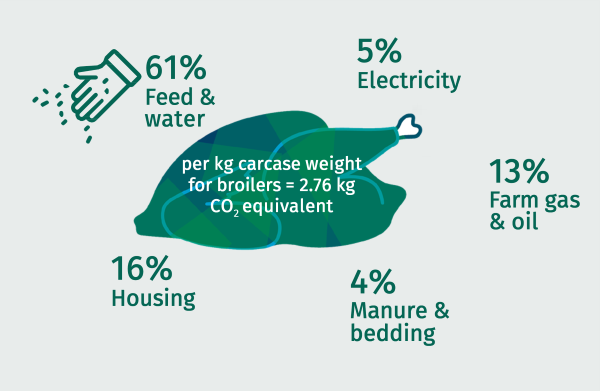New White Paper highlights importance of Intestinal Integrity score in broilers
The link between intestinal health and sustainable broiler production is the subject of a new white paper authored by poultry experts from the Monogastric Science Research Centre at the SRUC.
The new white paper, Intestinal Integrity – a critical parameter in sustainable broiler production, is underpinned by an extensive literature review, led by SRUC’s (Scotland’s Rural College) Dr Marwa Hussein, and substantiates the importance of closely monitoring, managing poultry intestinal health and its effect on the environment.
“The broiler industry is under pressure to meet sustainability challenges while increasing access to safe and affordable poultry meat,” says SRUC’s Professor Jos Houdijk, co-author of the white paper. “A heightened focus on intestinal health and integrity will prove very valuable in addressing these challenges and achieving progress.”
He adds that there have been big sustainability gains made thanks to genetic improvements, but maintaining this advantage is sensitive to gut health.
“A reduction in the Intestinal Integrity (I2) score for a current flock of broilers effectively cancels out years, if not decades of genetic selection.”
The new white paper examines the factors which impact broiler intestinal health, and assesses the value of Elanco’s Health Tracking System (HTSi) and I² index as a robust and practical means of achieving incremental improvements in this area.
The paper outlines the negative impact key intestinal diseases – such as coccidiosis, gizzard erosion, necrotic enteritis, and proventriculitis – can have on broiler performance through increased feed conversion ratio (FCR), morbidity and mortality. It also highlights the significant value the HTSi database and I² index offers, for monitoring and managing flock intestinal health, bird performance as well as welfare, profitability and sustainability.

The I² index is a unique, weighted index that gives flocks a score of between 0 and 100, based on 23 health conditions which are known to negatively impact intestinal health.
For many farms, a score of 90 or below is an indication that poor intestinal health is having a significant impact on FCR and bird performance, and poorer I² scores are linked to a rise in antibiotic usage as well as an increase in the amount of feed, water and space required per kilo of poultry meat produced.
Prof Houdijk says the white paper clearly demonstrates that the underlying conditions within the I² index are linked to reduced feed efficiency and an increase in the carbon footprint of poultry production. He explains that the consequences of this are an increased resource input for the expected output, more manure being produced, and birds taking longer to fatten – all of which contribute to the carbon footprint of poultry production.
“This white paper provides a valuable insight into why flock intestinal health matters and how the I² index can help producers improve the sustainability of poultry production.”
Elanco's Health Tracking System, Maxiban, Monteban, Hemicell, Elanco and the diagonal bar logo are trademarks of Elanco or its affiliates.